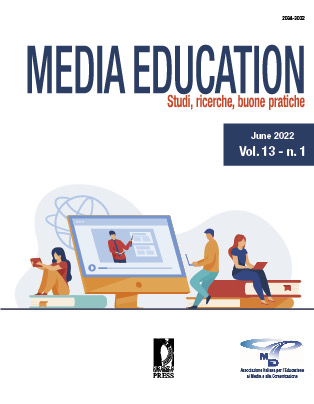Published 2022-04-28
Keywords
- digital competence,
- awareness,
- digital capital,
- digital literacy,
- socialization
Abstract
In recent years, the daily consumption of digital devices has filled international sociological scientific debate and reflection on the issue of data and the ethical, social and cultural implications of using such platforms. The issue of digital security has also become central to the public debate, in two significant moments: in 2018, on the occasion of the entry into force of the G.D.R. 2016/679 (General Data Protection Regulation) and in March 2020 on the occasion of the lockdown generated by the Covid-19 which, in fact, forced the whole world to re-organize its production and communication structure, intensifying the digitalization of communication processes and the use of devices in everyday life. In the first case, Article 8 offered the possibility to EU member states to lower the age threshold to thirteen to authorize the processing of personal data online, raising questions on the issue of the ‘digital awareness’ of minors. This is the background to this proposal, which aims to illustrate the results of a national survey on digital safety conducted by the Sapienza University of Rome. The research focuses on the degree of media awareness of adolescents, taking into account the conditioning of digital and social, school and family capital.
References
Bourdieu, P. (1980). Distinction: A Social Critique of the Judgement of Taste. Routledge, London.
Bourdieu, P. (1986). The forms of Capital in J. Richardson (ed.), Handbook of Theory and Research for the Sociology of Education, Greenwood, New York, pp.241-258 (trad.it. Forme di capitale, a cura di M. Santoro, Armando, Roma, 2016)
Calvani, A. Fini, A. Ranieri, M. (2011). Valutare la competenza digitale. prove per la scuola primaria e secondaria. Erickson, Torino
Celot, P. & Pérez Tornero, J. M. (2009). Study on Assessment Criteria for Media Literacy Levels. A comprehensive view of the concept of media literacy and the understanding of how media literacy level in Europe. final report for the European Commission, Brussels.
Ceretti, F. Felini, D. Giannatelli, R. (a cura di) (2006). Primi passi nella media education. Curricolo di educazione ai media per la scuola primaria. Erickson, Brescia
CISF, (2017). Le relazioni familiari nell’era delle reti digitali. Nuovo rapporto CISF 2017. San paolo edizioni, Roma
Coleman, J. (1990). Foundations of social theory. Cambridge and London, The Belknap Press of Harvard University Press, (trad. it. Fondamenti di teoria sociale, Bologna, Il Mulino, 2005).
Cortoni, I. (2011). Save the media. L’informazione sui minori come luogo comune. FrancoAngeli, Milano
Cortoni, I. (2016). Digital Competencies and Capabilities. Pre-adolescents Inside and Outside School. Italian Journal of Sociology of Education. vol.8. n.2, Padova: University Press. pp.170-185
Cortoni, I. (2020). Le competenze digitali nella scuola. Carocci, Roma
Cortoni, I. Lo Presti, V. (2018). Digital Literacy e capitale sociale. Una metodologia specifica per la valutazione delle competenze. FrancoAngeli, Milano
Cortoni, I. Lo Presti, V. (2015), Digital Capabilities. In Reflections on media education futures. Yearbook 2015. Nordicom, University of Gothenburg
Granovetter, M. (1995). Getting a Job. University of Chicago Press, Chicago
Kluzer, S. Rissola, G. (2015). Guidelines on adoption of DIGCOMP. European Commission, Brussel
Jenkins, H. (2006). Convergence culture: where old and new media collide. University press, New York
Loury, G. (1977). A dynamic theory of racial income difference. In Wallace P., LeMunds A. (eds). Women, minorities and employment discrimination. Lexington Books, Lexington
Lupton, D. (2015). Digital sociology. Routledge, London
Morcellini, M. (1997). Passaggio al futuro. Franco Angeli, Milano
Portes, A. (1998). Social capital: its origins and application in modern society. (trad. it Il capitale sociale, a cura di Ida Cortoni, Kurumuny, Lecce, 2013).
Redecker, C. (2017). European Framework for the Digital Competence of Educators: DIGCOMPEDU. Publications Office of the European Union, Luxembourg
UNESCO (2008), ICT COMPETENCY STANDARDS FOR TEACHERS. Competency Standards Modules, UK.
Van Dijck, J. Poell, T. de Waal, M. (2018). The Platform Society. public Values in a connective world. Oxford University
Vuorikari, R. Punie, Y. Carretero Gomez, S. Van Den Brande, G. (2016). DIGCOMP 2.0. The digital competence framework for citizens. Update phase 1: the conceptual reference model. report, Publications Office of the European Union, Brussel
Wastiau, P. et al., (2013). The Use of ICT in Education: A survey of schools in Europe. In European Journal of Education. Blackwell Publishing, Oxford, pp.11-27, DOI:10.2307/23357043

